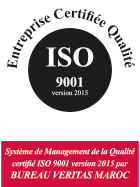Phase 1 of the Government’s program to strengthen economic governance and resilience to climate change is off to a good start. This is the conclusion of the AfDB’s latest report, following its monitoring mission to Morocco from February 10 to 14, 2025.

In the report, the pan-African banking institution states that “significant progress has been made thanks to the economic governance reforms carried out by the authorities. These reforms are beginning to have a tangible impact on the country’s macroeconomic framework, public accounts, and resilience indicators”.
The governance and performance of the public portfolio have been greatly improved. Net budget transfers to State-owned enterprises and establishments ( SOEs) are on the way to being brought under control. The same applies to restructuring operations (change of status, mergers, and other operations). Actions are underway in several sectors, notably the audiovisual and energy industries.
An in-depth study is being carried out on the creation of a public banking sector, with a view to optimizing state participation and structuring a financial hub, for which a study has just been launched, according to the AfDB.
As for the private sector, it is also beginning to make a major contribution to the Kingdom’s growth and economic transformation. Its share of the overall investment effort is estimated to have risen to 34.3% of GDP. Even the marginal coefficient of capital, which is the ratio between the value of capital and that of production, is said to be rising sharply. However, to be sure, technical assistance was mobilized to carry out the calculations.
According to the AfDB, the Kingdom is also resilient in the face of exogenous factors (including climate and gender inequalities). Morocco improved its ranking in the ND-GAIN Country Index from 70th to 67th, and thanks to the boom in renewable energies, Morocco’s energy dependence is becoming less and less significant. Fossil fuel imports have fallen to 88%.
Morocco has reached an important milestone in the reform of public equity with the adoption in June 2024 of the strategic orientations of the Government’s Shareholding Policy (PAE). The regulatory framework of Law 50-21 will be gradually implemented to clarify procedures for capital transactions, facilitate the reconfiguration of the public portfolio, and ensure consistency between the various pieces of legislation
Program contracts have also been signed between the Government and State-Owned Enterprises. These include six contracts (ONCF, ADM, EN, INRA, SNTL, and GBAM) which are currently in the scoping phase.
A new SOEs governance code (which takes gender and climate aspects into account) has also been adopted. The draft Code has been put out to public consultation by the National Corporate Governance Commission ( Commission nationale de gouvernance d’entreprise). The recommendations made following this consultation have been taken into account and validated. The draft Code and the related draft decree have been submitted for approval.
Last but not least, a number of SOLEs have been transferred from preliminary inspection to supporting inspection. The National Tourism Board (ONMT) was the first to do so in 2024, and a dozen new entities are expected to join the scheme during the current year.
A.D.


























